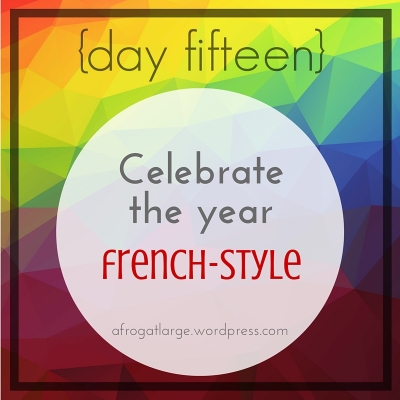
A common idea about French people is that they have a lot of holidays, and it’s one of the few that is actually true. Most French people get five weeks holiday a year by law, and surprise surprise, they often take the bulk of them during the summer in either July or August, hence why French towns often seem deserted when tourists come to visit (Paris in particular), that is, unless you go anywhere near the coastline and then there are people everywhere. There are also eleven public holidays on top of these 5 weeks. And then, throughout the year, a few significant religious or civil days are celebrated one way or another, and I’m about to give you the run down.
The French follow the catholic calendar of feast days, which is ironic considering it is pretty much an atheist country these days (see day fourteen for more info on that). However hypocritical you may think it is, I can understand why they wouldn’t want to get rid of these celebrations. It is a whole lot of time off, especially if you include the rather fantastic tendency in some corners to ‘faire le pont’ – make the bridge – if the holiday falls on a Thursday or Tuesday, by taking the Friday or Monday off as well and turn it into a big weekend off. I would be remiss if I didn’t also add that a lot of these days would be better known as ‘sports watching days’, especially football (actually football, you know, soccer)

Public Holidays
- Jour de l’An (New Year’s Day) on January 1st, is a day off across most of France; it exist as elsewhere purely to help people recover from the previous night’s celebrations, right? Let’s be honest, 75% of the country (any country) would take the day off sick otherwise.
- Lundi de Pâques (Easter Monday): interestingly, Vendredi Saint (Good Friday) is not a day off for most French people, unlike in the UK.
- Fête du Travail (Labour Day) is always on 1st May. It coincides with the International Workers’ Day and will often feature demonstrations by unions and other worker groups. On May 1st, it is also traditional to celebrate the arrival of Spring by selling and giving little bouquets of muguet (lily of the valley).
- Victoire 1945 – always on 8th May to celebrate the end of WWII. There will be a military parade down the Champs-Elysées in Paris including an air parade with airplanes spouting blue, white and red smoke.
- Jeudi de l’Ascension (Ascension Day) is a religious holiday to commemorate the Ascension of Jesus Christ to heaven. It is always on a Thursday, approximately 40 days after Easter.
- Lundi de Pentecôte (Pentecost Day) takes place about 10 days after Ascension Day, always on a Monday, and is another religious holiday to mark the end of the Easter period and celebrate the coming of the Holy Spirit.
- Fête Nationale (Bastille Day) is the French national day and takes place on 14th July. It celebrates the end of the monarchy and the birth of the French Republic. A direct translation is National Day, there is no mention of the Bastille, because whilst it is a symbol of the revolution, it occurred before the revolution was actually won. In every locality in France, there will be fireworks displays (even in small villages) and street parties with live music and barbecue food. Live music will often take place outside of bars and cafés and there may also be official Bals Musette for people to go dancing to traditional songs, often featuring accordions. Bigger towns will often have a fair at the same time. There will also be a military parade in Paris and the French president will make a speech, all of which will be televised.
- Assomption (Assumption Day) is a catholic feast which celebrates Mary the mother of Jesus being assumed into heaven at the end of her life. It is better known as ‘la fête du quinze août’ (the 15th August Day) and usually means absolute chaos on the roads in the South of France as people travel to or from their holiday location.
- Toussaint (All Saints Day) falls on 1st November. Unlike the US, Hallowe’en is not officially celebrated. Instead, it is a rather lugubrious day (in my memory) when the dead are commemorated and French people go to lay flowers at the tombs of their loved ones.
- Armistice (also known as la Fête du Onze Novembre) takes place on 11th November to commemorate the end of WWI on 11th November 1918 and remember the veterans of both world wars. It features a military parade on the Champs Elysées.
- Noël is Christmas Day, celebrated on December 25th. French people have many Christmas traditions, which I have shared on a couple of occasions previously.

Civil and Religious Feasts that are celebrated but not public holidays
- Epiphanie or Fête des Rois – the Kings Feast is a catholic feast taking place on January 6th to do with the visit of three Kings/Magi to Jesus. It is celebrated by everyone including non-religious people because it is an excuse to eat a special cake called Galette des Rois, that is sold in every bakery and supermarket straight after Christmas (and probably even before that, if I recall the rules of capitalism 101); some regions of France have a brioche instead, and nowadays they come with different fillings like apple or chocolate but the traditional galette is filled with frangipane (almond cream) and a little token/toy is hidden inside. There is an elaborate and fun ceremony around how to serve the cake (which is eaten warm) to ensure the token is given completely at random, which I explained in detail a year or two ago.
- La Chandeleur (Candlemas) is celebrated on February 2nd and is originally a religious feast, which I knew nothing about until I was researching it last week, as it is better known as Pancake Day, and basically everyone eats crèpes that evening.
- La Saint Valentin is Valentines Day on February 14th and is celebrated the same way as the UK and US with roses, chocolate, jewellery and other present-swapping and a dinner out for lovers everywhere.
- Mardi Gras is Fat Tuesday and is a religious feast looking ahead at the beginning of Lent by eating lots of rich food, including crèpes, waffles and beignets (doughnuts). It tends to take place between mid February and mid-March, depending on when Easter takes place. It is also Le Carnaval, which is marked by parades with floats and elaborate outfits, masquerade balls, and general merriment.
- Le Premier Avril is April Fool’s Day and is celebrated with practical jokes and the traditional Poisson d’Avril, which is particularly popular in French schools, as the aim is to sellotape a paper fish onto an adult’s back without them noticing.
- La Fête des Mères (Mothers’ Day) takes place on the last Sunday of May.
- La Fête des Pères (Fathers’ Day) takes place on the 3rd Sunday in June.
- La Fête de la Musique (Music Festival) takes place on June 21st. It is a free music festival which takes place across the whole of France. It was created in 1982 by the government to celebrate French and world music and encourage people to learn music and enjoy various musical genres. On that day, you may literally find a musician on every street corner in town centres. It’s a very festive day All musical styles are encouraged and it’s an open invitation for every wannabe busker to join in, but you also get professional musicians and bands performing for free.

- La Fête du Cinéma (Cinema Festival) is a 4-day-long festival that has taken place at the end of June since 1985 to promote the arts and culture. Every cinema entry costs 4 euros and you basically hope that the box-office will be great that week so you can see lots of films for next to nothing. I have great memories of queuing to watch a Freddy film in the middle of the afternoon in 1997.
- Le Réveillon de Noël is Christmas Eve and traditionally, French people will have their big celebration meal during the night of 24th December, sitting around the table for up to 6 hours with their family, serving roast turkey but also luxurious food like oysters and other seafood.
- La Saint Sylvestre is the Réveillon du Nouvel An a.k.a. New Year’s Eve and is also a big dinner party blow-out with friends rather than family. Foie gras is often served, cooked from scratch by the party, with champagne, lots of music, confetti and streamers. There are fireworks at midnight and people blow their car horns around town to make as much noise as possible (possibly to chase away the evil spirits as in olden times).



Chapeau!!!
Thank you!
I love this subject ! The banana chocolate ginger pie sounds wonderful. And it was interesting to hear about the holidays and also how the French stay thin. This is a fun blog.
I’m really happy you like it!